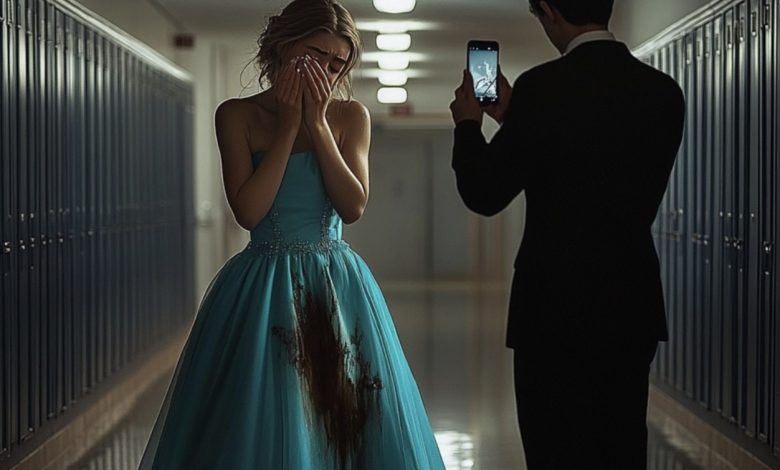
That day began like any other in our busy home. I had just pulled a fresh tray of chocolate chip cookies from the oven, the smell filling every corner of the kitchen. Upstairs, my two oldest daughters, Sophie and Liza, were laughing and planning their school pageant looks on the living room floor. Sophie is my daughter from my first marriage; Liza is my husband David’s daughter from his first marriage. Almost six years into blending our family, I still got such joy from hearing them giggle together.
“Mom, can we have cookies now?” Sophie’s cheerful voice drifted down the stairs.
“Only after homework’s done!” I called back, grabbing a glass of milk.
Moments later, both girls tumbled down the stairs and into the kitchen, faces bright with excitement. Liza’s dark curls bounced as she made a dramatic groan. “We’re starving!” she declared. Sophie, with her sandy-blonde waves, hopped onto a stool at the counter.
I handed them each a plate of cookies and milk. “Here you go, sweeties. But remember, pageant dress ideas only after schoolwork’s done.”
Liza’s eyes lit up. “Oh, Sophie—we have to talk about the Spring Pageant! You’re going to help me make matching dresses, right?”
Sophie hesitated, and I raised an eyebrow. “Matching dresses? That sounds like a lot of work.”
They both turned puppy-eyed on me. “Please, Mom? You’re amazing with the sewing machine!”
And who could say no to that? I smiled and nodded. “All right—matching dresses, but you two help design them.”
The rest of the morning was a whirlwind of locating fabric swatches, tracing patterns, and reading pageant rules online. By the time David walked in from work that afternoon, I had a rough sketch of two pale-blue gowns, each with delicate lace and pearly beads. He wrapped his arms around me and said, “That’s wonderful. Oh, by the way—my mom, Wendy, invited us all for Sunday dinner.”
My heart tightened. “Your mom wants all of us there?”
He hesitated. “She specifically asked about Liza, but, you know, she said it would be nice for everyone to come.”
I forced a smile. “Sure, we’ll go.” Inside, though, I felt uneasy. Wendy’s comments over the years had always been half-praise, half-criticism—especially toward Sophie, who wasn’t her biological granddaughter. I reminded myself that family dinners have ups and downs, and this would be good practice for the weekend pageant.
Sunday arrived, and we found ourselves seated around Wendy’s polished oak table. The meal was her famous pot roast, followed by homemade applesauce and buttery rolls. She seemed gracious at first, offering praise to Liza for always remembering to say “Please” and “Thank you.” She handed Liza a small jewelry box with a silver heart-shaped locket inside. Liza’s face lit up. Sophie, sitting silently beside her, watched with a small, disappointed smile.
After a lull, I cleared my throat. “Girls have exciting news, Mrs. Thompson. They want to enter the Spring Pageant this year.”
Wendy’s eyes flicked to Sophie first, then to Liza. She said, “That’s lovely for little Liza. She has your grace, dear.” Her smile froze. “Sophie, I’m sure you’ll cheer her on.”
I bristled but held my tongue. David jumped in. “Actually, both girls are doing it—together.”
Wendy’s eyebrow arched, and she pursed her lips. “Is that so? Together?” She turned to Liza. “Did you see that blue gown at the mall last month?” Liza shook her head, startled. “Oh, you simply must wear it on stage. It’ll highlight your features.” She gave Sophie a quick glance. “Of course, Sophie will understand—you know how things are.”
My chest tightened. I forced a calm, “They’ll wear matching dresses I’m making.” But Wendy only gave a tight nod. “Matching is fine if that’s truly what they want. But you’ll see sometimes one of them naturally stands out more.”
Sophie’s eyes filled with hurt. Liza reached for her hand. “Mom?” I leaned close. “Let’s go upstairs, girls.” I whispered, “Don’t let her get to you. We’ll make the best dresses we can.”
David followed, giving his mother a warning look. She only smiled, as though nothing untoward had happened.
That week I stayed up late stitching and beading. I even learned a new embroidery stitch just for their names on the belt lines. The girls woke each morning to find new progress and twirled before the mirror, squealing. “You have to see this!” they would call.
By Friday night, the dresses were finished. Pale blue tulle skirts swept the floor, bodices woven with lace and tiny pearls. The last thing I did before bed was hang them in the guest-room closet at Wendy’s—they’d invited us to stay overnight to make the early pageant time easier. I didn’t want the dresses to crease or get dirty in transit.
Sometime after midnight, I heard a faint rustle. Assuming it was David checking on me, I rolled over. The next morning, the girls burst into my room. “Mom! I have to show you something!”
I followed them to the closet, where I found Liza’s dress untouched—and Sophie’s dress splayed across the shelf, fabric torn along the side seam, brown tea stains spreading across the lace. My breath caught, and I sank to my knees beside Sophie, who was trembling.
“I saw Grandma come in here last night,” Liza whispered. “She turned on the lamp, took Sophie’s dress, and carried it out.”
Just then, Wendy appeared in the hallway, looking contrite. “Oh, what a dreadful accident,” she said, voice too calm. “I didn’t mean to ruin anything—just spilled my tea, and I was so distracted. I’m so sorry, dear.”
Sophie’s lip quivered. “But you did it on purpose.”
Wendy’s smile froze. “I would never—”
Liza stepped forward, voice strong: “I saw you.”
Our daughter, seated in the dressing room hours later with a borrowed dress from a friend, whispered to me, “That woman hates me because I’m not her blood.” My own heart ached with anger and sadness.
On stage, Sophie glided in wearing the borrowed gown—no less beautiful, but her dignity was what shone through. Liza stood proudly beside her, clutching a small bouquet. They didn’t win the top prize—they placed second—but watching Sophie’s head held high and Liza’s supportive hug at the end felt more victorious than any crown.
Afterward, as we headed home, Wendy called my phone. She asked to speak. I answered, and she said, “I meant what I said. Some people don’t belong. You should have kept Sophie home.”
I closed the car door and handed the phone to David. “You talk to her,” I said. He refused her call instead.
That night, I removed Wendy’s contact info from my phone. Sophie and Liza fell asleep side by side, still in their pageant makeup and matching smiles—more united than ever.
Three months later, a package arrived at our front door. Inside were two identical gift boxes, each with a pale-blue ribbon. I opened one; inside was a handwritten note:
My dear Sophie and Liza,
I’ve been wrong. You both deserve to shine—together and equally. I’m proud of you, and I’m sorry I didn’t see sooner.
Love, Grandma
I watched the girls unpack the boxes—inside, two delicate silver bracelets engraved with each girl’s name. Sophie slipped hers on. Liza did the same. They looked at me with bright tears in their eyes.
“See?” I told them. “Kindness can come late, but it still counts.”
We haven’t seen Wendy much since that gift. But Sophie and Liza have learned a powerful lesson: real family is built on love and respect, not blood alone. And a child’s courage can sometimes teach an adult what truly matters.
Life goes on. This year’s Spring Pageant is coming up soon, and yes, the girls will have new matching dresses—this time with no unexpected surprises. I’ll work the sewing machine side by side with them, confident that their unbreakable bond will outshine any misguided cruelty. Because nothing, not even a grandmother’s jealousy, can stop two sisters who know they belong together.





